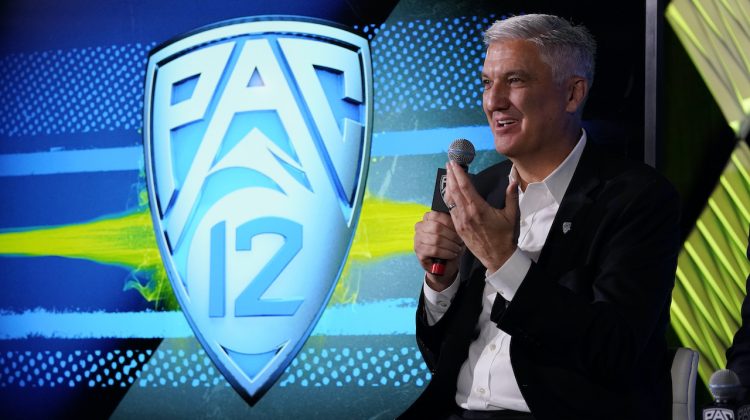It has been one week since the Pac-12 schools announced an end to their legal dispute, and George Kliavkoff remains employed as commissioner.
He made it through Christmas. Will he survive the New Year?
Kliavkoff has been “on the clock” since the 10 departing schools agreed to a settlement with the two remaining schools, according to a source.
The outbound universities have little need for him.
The remaining universities have no regard for him.
He has been a zombie commissioner since early August, when he failed to secure a media rights deal and the conference collapsed.
Kliavkoff remained in place through the fall as the schools engaged in a legal fight to determine responsibility for a litany of financial liabilities facing the conference.
One of those liabilities: Kliavkoff’s contract.
The specifics remain hidden from public view, but we can guess with reasonable accuracy. Kliavkoff is two-and-a-half years into his tenure and, based on the Pac-12’s most recent tax filings, earns approximately $3.5 million per year.
If we assume he signed a five-year deal in the spring of 2021 — at the time, the Pac-12 presidents called him “a visionary leader” — then Kliavkoff has two-and-a-half years left at roughly $3.5 million annually.
That’s an $8.75 million liability if the schools move to dismiss Kliavkoff this winter.
According to the settlement announced last week, Washington State and Oregon State received “specific guarantees against potential future liabilities.”
So let’s make another assumption: The schools agreed to share equally in the liabilities.
If we divide Kliavkoff’s remaining compensation by 12, the cost of paying him to go away is $729,000 per school.
Unless, of course, he’s fired for cause.
It’s easy to argue that Kliavkoff was negligent, or broadly incompetent, as he first failed to keep USC and UCLA in the conference, then embarked on a misguided media rights strategy that led to the Aug. 4 collapse. But that might be a difficult case to prove when Kliavkoff inevitably fights back.
After all, the university presidents set the agenda and drove the negotiating strategy. He reported to them frequently throughout the 13-month saga.
Ultimately, the conference collapsed because of the governing board’s lethal mix of ignorance, arrogance and incompetence.
Instead, the schools might consider piggybacking off the lawsuit that just concluded in Washington state with a resounding victory, at both the superior court and supreme court levels, for the Cougars and Beavers.
The courts determined that the two remaining schools constitute the entirety of the Pac-12’s governing board.
That removing the outbound schools from the board was, in fact, the correct interpretation of the bylaws.
That the precedent established with USC and UCLA in the summer of 2022 and with Colorado in July 2023 should have been repeated with the subsequent departures of Utah, Arizona, ASU, Oregon, Washington, Stanford and Cal.
That the number of departing schools was immaterial to Chapter 2, Section 3 of the Pac-12 bylaws, which states:
“If any member does deliver a notice of withdrawal prior to August 1, 2024, in violation of this chapter … the member’s representative to the CEO Group shall automatically cease to be a member of the CEO Group and shall cease to have the right to vote on any matter before the CEO Group.”
When USC and UCLA left for the Big Ten, their board seats were removed — Kliavkoff admitted as much under oath in a separate legal case, as the Hotline first reported.
And yet, after 10 schools had announced their departures, Kliavkoff disputed the interpretation of the bylaws that he had already followed.
In a letter to the presidents of WSU and OSU in early September, he wrote:
“Your suggestion that ten of the Conference’s 12 members have ‘withdrawn’ from the Conference within the meaning of the Bylaws is mistaken. Not one member school has signaled any intention — or actually attempted — to leave Conference play at any time prior to the end of the current fiscal year on July 31, 2024, or to take back and exploit their media rights.
“We simply cannot accept the suggestion that only two members. — Oregon State University (OSU) and Washington State University (WSU) — now have the right to determine by themselves all issues affecting the Conference, and determine the course of all revenue coming into the Conference, to the exclusion of the other ten member schools.”
Kliavkoff seems to be contradicting his previous position in claiming the 10 departing schools had, in fact, retained their board seats.
And so we ask: Did he effectively commit an act of treason against the Pac-12? Did he act in a harmful manner?
After all, Kliavkoff sided with the departing schools in his letter. But according to the courts, WSU and OSU were the conference. Their presidents were the board.
So was he working against the best interest of his employer? And if so, is that grounds for termination with cause?
We have no insight into the legal strategy, but the potential for the process to turn messy is clear:
— The schools attempt to fire Kliavkoff with cause.
— He responds with a wrongful termination lawsuit.
— The presidents fear discovery.
— Everyone settles for a buyout that’s considerably less than $8.75 million but substantially more than $0.
Would the difference between the total amount owed to Kliavkoff and a settlement figure be worth the resources and legal costs?
Fans might support the fight. But university presidents, one of the most risk-averse groups on the planet, would inevitably prefer the path of least resistance.
So in the coming weeks, if not days, don’t be surprised if the schools dismiss Kliavkoff, pay him the full buyout, promote deputy commissioner Teresa Gould — she is both highly competent and fully qualified — and move on.
The clock is ticking.
*** Send suggestions, comments and tips (confidentiality guaranteed) to pac12hotline@bayareanewsgroup.
*** Follow me on Twitter: @WilnerHotline
*** Pac-12 Hotline is not endorsed or sponsored by the Pac-12 Conference, and the views expressed herein do not necessarily reflect the views of the Conference.
Related posts:
 Wilner Hotline – Pac-12 Mailbag, Big Miss on Arizona Basketball, More
Wilner Hotline – Pac-12 Mailbag, Big Miss on Arizona Basketball, More  Hotline mailbag: Detailing the Pac-12’s liabilities, the ‘Pac-2’ and the MW, future of the NW rivalries, CFP rules, Bay Area regret and more
Hotline mailbag: Detailing the Pac-12’s liabilities, the ‘Pac-2’ and the MW, future of the NW rivalries, CFP rules, Bay Area regret and more  Wilner – Vision for the future of Pac-12 football: It’s 2033, and the conference has reformed with the old guard
Wilner – Vision for the future of Pac-12 football: It’s 2033, and the conference has reformed with the old guard 
Southern California guard JuJu Watkins,(AP Photo/Mark J. Terrill)
Pac-12 WBB Preview – UCLA vs USC at the top, tough competition and rivalries
